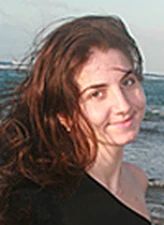Ira Didenkulova

The 2010 Plinius Medal is awarded to Ira Didenkulova in recognition of her outstanding contributions to solve complex problems of oceanography and coastal engineering by applying nonlinear wave theory to marine natural hazards, including tsunamis, freak waves and storm waves.
Ira Didenkulova is a young scientist who graduated with a Master of Acoustics degree from the Nizhny Novgorod State University, Russia, in 2003, defending a thesis on the “Reconstruction of the wave source” and who got a first Ph.D. in Fluid Mechanics at the Nizhny Novgorod State Technical University, Russia, in 2006, defending a thesis on the “Runup of long waves on the sloping beach and analyses of real events”, and then a second Ph.D. in Civil Engineering at the Tallinn Technical University, Estonia, in 2008, defending a thesis on “Long wave dynamics in coastal zone”.
Her main research interest was focused on the run-up of non-linear long waves, like tsunamis, and she was able to develop a set of universal parametric run-up formulae of great practical value that do not require the shape of the incident wave, which is usually unknown. She was also able to explain the amplification of long waves with an asymmetric shape and a steep front. In analysing the freak wave events in the ocean, and especially in the coastal zone, she has also demonstrated the potential of the analytical theory of long wave run-up applied to a random field of irregular waves for estimates of the probability of coastal freak wave occurrences. Further she has combined the skill of an experimental oceanographer with the sound expertise of an ocean wave theoretician to study the impact on the beach of large storms such as the hurricane Dean in the French West Indies in 2007. Her recent studies include both experiments to measure properties of waves in the near-shore, theoretical and experimental investigations into the run-up properties and measurements of local sediment transport.
Didenkulova’s research has been published in 15 papers in international peer-reviewed journals, in 11 papers in national peer-reviewed journals, in 4 chapters of specialist books on extreme ocean waves and tsunamis, and has been presented in numerous international conferences.
In summary, Didenkulova has attained outstanding research achievements in the field of extreme ocean waves such as tsunamis, freak waves and storm waves, brilliantly contributing in the most effective of manners to evaluation of the impact of such waves on the coastal zone and providing the basis for the mitigation of their effects.
